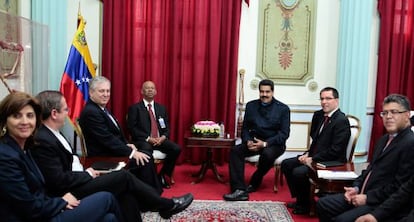Talks will be held with opposition leaders on Thursday, Maduro announces
Some political factions have vowed to stay away from the discussions

Venezuelan President Nicolás Maduro and the leaders of some opposition factions are expected to finally hold their formal sit-down talks on Thursday. The meetings are aimed at easing the social, political and economic tensions that have gripped the country and ignited two months of deadly anti-government protests.
On Tuesday night, Vice President Jorge Arreaza held a preliminary meeting with the chief of the opposition’s umbrella organization, United Democratic Panel (MUD), as well as with some leaders of parties opposed to the Maduro government.
Brokered by a mission of eight foreign ministers from the Union of South American Nations (Unasur), the talks were held “to determine if the conditions for dialogue existed,” said MUD secretary general Ramón Guillermo Aveledo. After three hours, Aveledo and Arreaza announced that there was “good news.”
Later, Maduro said in a televised address that formal talks will be held on Thursday. “There were tense moments,” but both sides "held frank discussions and were respectful of one another,” he said.
“We agreed on a series of meetings,” the president explained, adding that they will be mediated by the foreign ministers of Brazil, Luiz Alberto Figueiredo; Colombia, María Angela Holguín; and Ecuador, Ricardo Patiño; as well as a representative from the Vatican.
But even before they are to begin, the potential success of those encounters is still in question. Representatives of the opposition People’s Will (VP) party – the grouping led by jailed former mayor Leopoldo López – have said they won’t attend. At the same time, Miranda state governor and former presidential candidate, Henrique Capriles, who leads his own opposition faction, said the talks do not “mean that the people will renounce their rights to protest.”
“The people have all the right in the world to protest the thousands of unresolved problems facing our country,” Capriles wrote on his Twitter account.
“We are not going to accept dialogue that is aimed at demobilizing citizens”
The anti-government demonstrations, which officially began on February 12, have claimed at least 41 lives and have left some 600 people injured.
The opposition had been seeking a series of demands before agreeing to sit down with Maduro. Among them are López’s release from the military prison outside of Caracas, where he has been held since February 18, and a general amnesty for those who have been arrested during the protests.
Besides VP, the Social Christian Copei Party, the leftwing Causa R and the conservative Proyecto Venezuela also stayed away from Tuesday night’s meeting, for a number of different reasons. Some in the opposition believe that Unasur is slanted toward Maduro while others also believe that the government should meet their demands before they sit down at the negotiating table.
“Holding peaceful protests are rights that we won’t give up; we are not going to accept any dialogue that is aimed at demobilizing citizens,” wrote opposition leader María Corina Machado on her Twitter account. Along with López, she helped organize the nationwide rallies on February 12 that were held under the slogan “The Exit,” and which were called to demand that Maduro hold new elections. Machado, who was kicked out of the National Assembly earlier this month, is also facing a criminal investigation.
“From here on out, we are going to respect and discuss our differences,” said Vice President Arreaza, who was the son-in-law of the late President Hugo Chávez.
Unasur sent a mission on Monday consisting of the foreign ministers of Argentina, Brazil, Uruguay, Chile, Ecuador, Bolivia, Colombia and Suriname.
Tu suscripción se está usando en otro dispositivo
¿Quieres añadir otro usuario a tu suscripción?
Si continúas leyendo en este dispositivo, no se podrá leer en el otro.
FlechaTu suscripción se está usando en otro dispositivo y solo puedes acceder a EL PAÍS desde un dispositivo a la vez.
Si quieres compartir tu cuenta, cambia tu suscripción a la modalidad Premium, así podrás añadir otro usuario. Cada uno accederá con su propia cuenta de email, lo que os permitirá personalizar vuestra experiencia en EL PAÍS.
¿Tienes una suscripción de empresa? Accede aquí para contratar más cuentas.
En el caso de no saber quién está usando tu cuenta, te recomendamos cambiar tu contraseña aquí.
Si decides continuar compartiendo tu cuenta, este mensaje se mostrará en tu dispositivo y en el de la otra persona que está usando tu cuenta de forma indefinida, afectando a tu experiencia de lectura. Puedes consultar aquí los términos y condiciones de la suscripción digital.








































